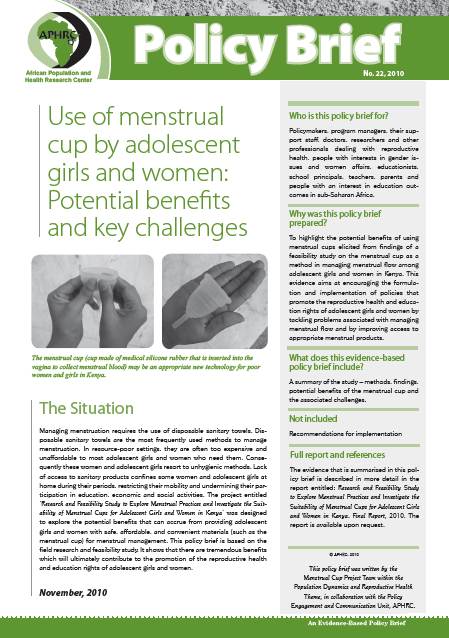Use of menstrual cup by adolescent girls and women: Potential benefits and key challenges - Policy Brief No. 22
APHRC (2010)

Published in: 2010
Publisher:
The African Population and Health Research Center (APHRC), Nairobi, Kenya
Author:
APHRC
Uploaded by:
SuSanA secretariat
Partner profile:
African Population and Health Research Center
13105 Views
455 Downloads
Content - Summary
This policy brief is based on the field research and feasibility study. It shows that there are tremendous benefits which will ultimately contribute to the promotion of the reproductive health and education rights of adolescent girls and women.
Managing menstruation requires the use of disposable sanitary towels. Disposable sanitary towels are the most frequently used methods to manage menstruation. In resource-poor settings, they are often too expensive and unaffordable to most adolescent girls and women who need them. Consequently these women and adolescent girls resort to unhygienic methods. Lack of access to sanitary products confines some women and adolescent girls at home during their periods, restricting their mobility and undermining their participation in education, economic and social activities. The project entitled ‘Research and Feasibility Study to Explore Menstrual Practices and Investigate the Suitability of Menstrual Cups for Adolescent Girls and Women in Kenya’ was designed to explore the potential benefits that can accrue from providing adolescent girls and women with safe, affordable, and convenient materials (such as the menstrual cup) for menstrual management.
Bibliographic information
APHRC (2010). Use of menstrual cup by adolescent girls and women: Potential benefits and key challenges - Policy Brief No. 22. The African Population and Health Research Center (APHRC), Nairobi, Kenya
Filter tags
English Factsheets and policy briefs Menstrual Health and Hygiene (MHH) Schools Sub-Saharan Africa















